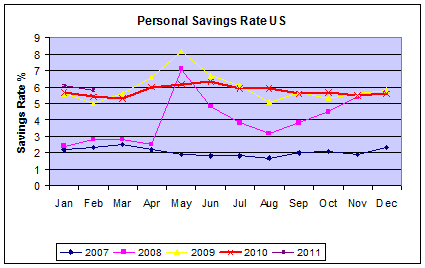A few months ago, I wrote an article about the personal savings rate stabilizing and more Americans seemed to be spending money on Christmas in 2010 vs 2009. I was very curious to see if we’re just stupid Americans who saved a little money and are now off spending like brainless idiots again.
So I’ve decided to revisit the data from the US department of commerce and see what we’re doing as a whole and I was pleasantly surprised. Despite the crappy interest rates of late, people still seem to be squirreling away a little more money. I’ve attached the latest data below. Personal savings has managed to go up ever so slightly at about 0.3% since this time last year, which is great. I’m looking forward to looking at this data again after tax season is over. I’d like to see if people are going to spend their income tax returns like they did in 2010 or if they’re going to stockpile some of it away like we saw in 08 and 09. I’ll report back again in about 6 months.
What do you think of this data?

Leave a Reply